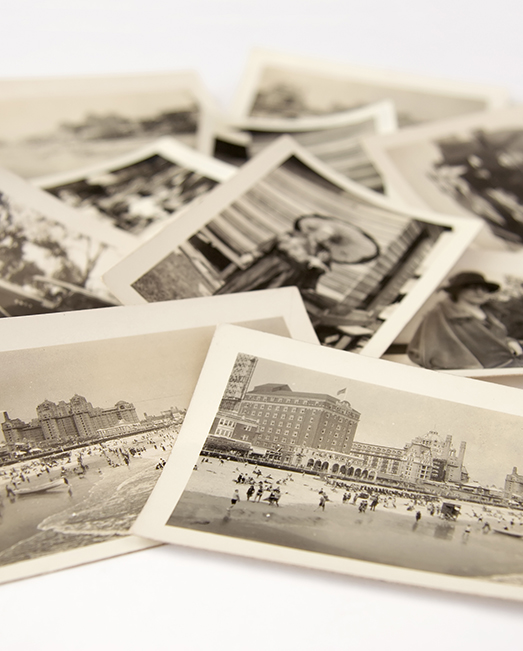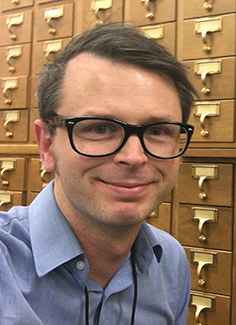Community
Copyright@ Australian Catholic University 1998-2024 | ABN 15 050 192 660 CRICOS Reg: 00004G
Copyright@ Australian Catholic University 1998-2024 | ABN 15 050 192 660 CRICOS Reg: 00004G

There is a popular aphorism, one that is often attributed to the British statesman Winston Churchill but which was likely first coined by Spanish-American philosopher George Santayana, that declares: “Those who do not learn history are doomed to repeat it.”
It would be tempting for historians to advance this as an argument in favour of studying history – and indeed, some have. But ACU historian Dr Benjamin Mountford prefers another aphorism, one that is commonly attributed to the American author Mark Twain, who was reputed to have said: “History doesn’t repeat itself, but it does often rhyme.”
“What I take from that quote is that history doesn’t have to give us a map for the future,” says Dr Mountford, a senior lecturer with ACU’s Faculty of Education and Arts, “but it does give us really important information to contextualise and enrich the way we respond to problems that emerge in the contemporary world.”
In other words, while lessons from the past won’t necessarily ward off the doom of repeated mistakes, they can provide us with guidance on how best to act in the face of challenges.
“Let’s take the pandemic as an example. It was no surprise, of course, that when Covid arrived and we all had to deal with what we so often heard were ‘unprecedented times’, it was historians that came along and said, ‘Well, in some ways they’re unprecedented, but in other ways there are issues and challenges here that societies have confronted before, and here are some of the things that helped us to get through in the past.’”
Like many historians, Dr Mountford stands up for the notion that history is worthy of study on its own terms. At the same time, he is enthusiastic about the benefits that learning history can have for people and society. Take, for example, the concept of historical empathy, which helps us to engage with the past while understanding our role in the world today.
“Historical research requires us to put ourselves in someone else’s shoes and to think about their aspirations, their opportunities, and their anxieties,” he says.
“Even if they seem quite distant or their behaviour seems unpleasant or unjustified, we put ourselves in a position to understand their situation, their thinking and their actions. That makes history a powerful empathetic tool.”
While Dr Mountford’s interest in history stems from his childhood, he didn’t always plan to become a research historian. In fact, his initial goal was to become a high school history teacher.
Raised in Bunbury, a coastal town south of Perth, he came from a family of collectors. His childhood home was filled with old things – objects with stories attached to them – nurturing his interest in learning about people’s lives.
While studying to obtain his teaching qualification, he worked in a part-time job at the Western Australian Museum, an experience that prompted him to shift course.
“I did some tour guiding and worked with school students coming to the museum, and that got me interested in museum education, which eventually steered me towards an academic path,” says Dr Mountford, who is currently co-editor of History Australia, the journal of the Australian Historical Association.
“It was really that sense of getting to grips with people’s stories and exploring the different ways that we can think about the past and how it has meaning for us today.”
His upbringing in a small town, at a time when Perth was commonly referred to as the world’s most remote city, ultimately shaped his research interests.
“Growing up in that part of the world, it was easy to feel a bit isolated, but I’d always been interested in the way that, even in that corner of WA, you could see and feel a connection with the rest of the world,” says Dr Mountford, whose research focuses on global history, British and British imperial history, and Australian history.
“There were migrant communities from all corners of the globe. Bunbury is a port town, and so there were ships always arriving from different parts of the world, American navy vessels stopping by, all sorts of products coming in, and out. As I developed as an historian and a researcher, I started to explore how those connections between Australia and the rest of the world had evolved over time, and some of the legacies – both negative and positive – that have shaped the sort of society we continue to live in today.”
People love stories. Some might even say that storytelling is what makes us human. And according to Dr Mountford, the skill of telling stories in a compelling fashion is one of the things that separates history from other academic disciplines.
“History doesn’t really work unless the historian can present their facts and findings in a way that is interesting to the audience they’re speaking to,” he says. “In essence, I think all great historians are great storytellers.”
Does that mean that the study of history can be justified simply because it’s interesting? Should one engage in historical study just because they’re fascinated in the stories of the past?
Says Dr Mountford: “I would argue that an enjoyment of history, a passion for learning about history, will always be a worthwhile endeavour. But by the same token, studying history enriches us as people and makes us better equipped to deal with the challenges we face in our own time. Studying history helps to prepare you for a wide array of career pathways – where advanced communication, problem-solving, research and analytical skills are required.”
The products of historical study might sometimes seem less tangible and less immediate than those stemming from other disciplines, but they are – nonetheless – indispensable. History analyses how societies function, contributes to cultural understanding, and gives us a range of practical skills that are useful in our careers and our lives.
“It can help us to be better citizens and better people,” says Dr Mountford, “while also gaining a greater understanding of how the society works, thereby serving as a tool for dealing with the great problems of our age.”
Dr Benjamin Mountford is a senior lecturer in history with ACU’s Faculty of Education and Arts. His research focuses on global history, British and British imperial history, and Australian history. His first book, Britain, China, & Colonial Australia, was awarded the 2017 Prue Torney Fellows Award.

Keen to study history at ACU? Explore the options.
Copyright@ Australian Catholic University 1998-2024 | ABN 15 050 192 660 CRICOS Reg: 00004G